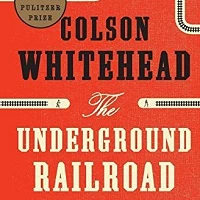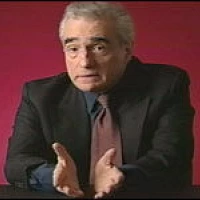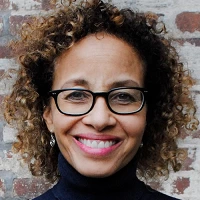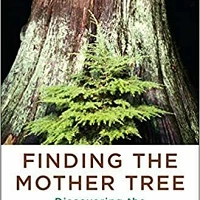You wouldn't guess that Luce spent his early years as a child soldier in the war-torn country of Eritrea, a trauma that he's clearly worked hard to overcome with the help of his adoptive parents, played by Naomi Watts and Tim Roth, whom he lives with in Arlington, Va.
Everyone seems deeply invested in Luce's future, partly because he's so accomplished, and partly because there's no denying the symbolic power of an African immigrant who overcame an unimaginable hell to become an American success story. No one understands this better than Luce's history teacher, Harriet Wilson, played by a steely and authoritative Octavia Spencer. She's tough on her students, especially her black students, and she reminds them that society will automatically view them as inferior to their white peers.
In that context, someone like Luce is clearly a godsend — or is he? When Luce turns in a paper echoing the violent revolutionary ideas of the anti-colonialist philosopher Frantz Fanon, Harriet is concerned and decides to search Luce's locker, where she finds a bag of illegal fireworks. Rather than going to him or the school principal, she hands the fireworks over to his mom, and advises her to keep a close eye on her son.
Harriet's actions, designed to protect Luce while also neutralizing any potential threat, seem like a violation of school protocol as well as basic common sense. But it's not the only time the movie sacrifices plausibility to explore a larger point about how our good intentions can get the better of us. The movie was adapted from a play by JC Lee, who wrote the script with the director, Julius Onah, and they don't try to disguise the story's theatrical origins. This is unabashedly a thesis movie, in which the characters speak in rather too perfectly formulated sentences and even a simple conversation can become a battle of wills.
When Luce's parents finally confront him, he claims that he and his friends often share lockers and the fireworks could belong to anyone. Harrison keeps you guessing in a performance that is both slippery and precise. He conveys the uncanny sense that Luce himself is always performing, always calculating the most presentable version of himself. But you can see the resentment quietly bubbling away beneath his charming smiles and polished speeches.
Is Luce a troubled individual who has mastered the art of code switching to an almost sociopathic degree? Or is he really a good kid caught up in a big misunderstanding? Luce keeps playing games with everyone's perceptions. He has no interest in being subjected to any kind of labeling, and he clearly believes that sanctifying people of color is ultimately no better than demonizing them. In stoking and dodging the suspicions of his teacher and his parents, he also lays bare their own blind spots and prejudices.
Watts and Roth are especially good as two loving, liberal-minded parents slowly realizing they don't know their son as well as they thought. Their confusion and helplessness reminded me of the work of Michael Haneke, the great Austrian director known for his ruthless eviscerations of bourgeois cluelessness. (It's probably no coincidence that Watts and Roth previously played a couple in Haneke's 2008 shocker, Funny Games.) Director Onah has improved and then some from his work on last year's forgettable sci-fi thriller The Cloverfield Paradox. He guides this tricky, talky material with both an analytical distance and a willingness to consider every character's perspective.
The way Onah confronts race, privilege, tokenism and the politics of respectability could hardly be more relevant to an era when issues of representation are being raised in every arena, from academia to the entertainment industry. The film is on less solid ground when it brings in other characters, including Harriet's troubled sister and two of Luce's classmates who have struggles of their own. The story starts to feel like a grab-bag of talking points, including mental illness, sexual assault and teen privacy in the social-media age. Like Luce himself, this smart, promising movie strains to be all things to all people, rather than simply being the truest version of itself.
DAVE DAVIES, HOST:
This is FRESH AIR. The psychological drama "Luce" stars Kelvin Harrison Jr. as a star high school student who winds up in conflict with his history teacher, played by Octavia Spencer. The movie touches issues of race, privilege and identity and features Naomi Watts and Tim Roth as Luce's parents. Film critic Justin Chang has this review.
JUSTIN CHANG, BYLINE: The title character in the coolly engrossing new movie "Luce" is a high schooler who seems exemplary from every angle. Played in a remarkable performance by Kelvin Harrison Jr., Luce Edgar is handsome and popular, an academic and athletic star who gives inspiring speeches at school assemblies. You wouldn't guess that Luce spent his early years as a child soldier in the war torn country of Eritrea, a trauma that he's clearly worked hard to overcome with the help of his adoptive parents, played by Naomi Watts and Tim Roth, whom he lives with in Arlington, Va.
Everyone seems deeply invested in Luce's future, partly because he's so accomplished, and partly because there's no denying the symbolic power of an African immigrant who overcame an unimaginable hell to become an American success story. No one understands this better than Luce's history teacher, Harriet Wilson, played by a steely and authoritative Octavia Spencer. She's tough on her students, especially her black students, and she reminds them that society will automatically view them as inferior to their white peers. In that context, someone like Luce is clearly a godsend. Or is he?
When Luce turns in a paper echoing the violent revolutionary ideas of the anti-colonialist philosopher Frantz Fanon, Harriet is concerned and decides to search Luce's locker, where she finds a bag of illegal fireworks. Rather than going to him or the school principal, she hands the fireworks over to his mom and advises her to keep a close eye on her son.
Harriet's actions, designed to protect Luce while also neutralizing any potential threat, seem like a violation of school protocol as well as basic common sense. But it's not the only time the movie sacrifices plausibility to explore a larger point about how our good intentions can get the better of us.
The movie was adapted from a play by J.C. Lee, who wrote the script with the director Julius Onah. And they don't try to disguise the story's theatrical origins. This is unabashedly a thesis movie, in which the characters speak in rather too perfectly formulated sentences. And even a simple conversation can become a battle of wills.
When Luce learns that Harriet searched his locker, he invites her to come to a debate prep session, telling her he could use her help with an argument.
(SOUNDBITE OF FILM, "LUCE")
KELVIN HARRISON JR: (As Luce Edgar) Basically, my question that I hope Ms. Wilson can help me with is around this idea of reduced expectation versus the affirmation by the court of student civil rights. Like, what are the criteria for evaluating what's a violation of privacy?
OCTAVIA SPENCER: (As Harriet Wilson) Is privacy a civil right?
HARRISON: (As Luce Edgar) I think so.
SPENCER: (As Harriet Wilson) Maybe the law isn't so sure.
HARRISON: (As Luce Edgar) If I went through your desk without your knowing, would you feel like your privacy was violated?
SPENCER: (As Harriet Wilson) Yes, I would. So? Feelings aren't a legal argument.
HARRISON: (As Luce Edgar) In the New Jersey case, the teacher assumed the girl was guilty because of her feelings.
SPENCER: (As Harriet Wilson) That's called reasonable suspicion. It's all the police need to search your car.
HARRISON: (As Luce Edgar) So it's about what's reasonable?
SPENCER: (As Harriet Wilson) That's what courts are for.
HARRISON: (As Luce Edgar) Really it's just about people though - right? - whether they conform to what we think they are.
SPENCER: (As Harriet Wilson) It's not that simple.
HARRISON: (As Luce Edgar) Nothing ever is.
CHANG: When Luce's parents finally confront him, he claims that he and his friends often share lockers, and the fireworks could belong to anyone. Kelvin Harrison Jr. keeps you guessing in a performance that is both slippery and precise. Is Luce a troubled individual who has mastered the art of code-switching to an almost sociopathic degree, or is he really a good kid caught up in a big misunderstanding?
Luce keeps playing games with everyone's perceptions. He has no interest in being subjected to any kind of labeling. And he clearly believes that sanctifying people of color is ultimately no better than demonizing them. In stoking and dodging the suspicions of his teacher and his parents, he also lays bare their own blind spots and prejudices.
Naomi Watts and Tim Roth are especially good as two loving, liberal-minded parents slowly realizing they don't know their son as well as they thought. Their confusion and helplessness reminded me of the work of Michael Haneke, the great Austrian director known for his ruthless evisceration of bourgeois cluelessness. It's probably no coincidence that Watts and Roth previously played a couple in Haneke's 2008 shocker "Funny Games."
Director Onah has improved and then some from his work on last year's forgettable sci-fi thriller "The Cloverfield Paradox." He guides this tricky, talky material with both an analytical distance and a willingness to consider every character's perspective. The way Onah confronts race, privilege, tokenism and the politics of respectability could hardly be more relevant to an era when issues of representation are being raised in every arena from academia to the entertainment industry.
The film is on less solid ground when it brings in other characters, including Harriet's troubled sister and two of Luce's classmates who have struggles of their own. The story starts to feel like a grab-bag of talking points, including mental illness, sexual assault and teen privacy in the social media age. Like Luce himself, this smart, promising movie strains to be all things to all people rather than simply being the truest version of itself.
DAVIES: Justin Chang is a film critic for the LA Times. On Monday's show, Terry talks to filmmaker Rodney Evans. He's lost much of his vision, but he's still making movies. His new documentary "Vision Portraits" is about how he and three other blind or visually impaired artists - a writer, a dancer and a photographer - continue to do their work. Hope you can join us.
(SOUNDBITE OF BILL CHARLAP TRIO'S "COOL")
DAVIES: FRESH AIR's executive producer is Danny Miller. Our technical director and engineer is Audrey Bentham, with additional engineering support from Joyce Lieberman and Julian Herzfeld. Our associate producer for digital media is Molly Seavy-Nesper. Therese Madden directed today's show. For Terry Gross, I'm Dave Davies.
(SOUNDBITE OF BILL CHARLAP TRIO'S "COOL") Transcript provided by NPR, Copyright NPR.

 Live Radio
Live Radio

























































































































































































































































































































































































































